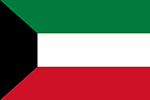
Population
4M+
CHRISTIAN PERSECUTION STATUS
minimal
Freedom
CHRISTIAN POPULATION
18%
Status of
the church
The majority of Kuwaiti citizens are Muslims; only a few hundred are Christians. More than two-thirds of Kuwait’s population, however, are immigrants. The constitution grants “absolute” freedom of religion but names Islam as the state religion and states that religious practice must not “conflict with public policy or morals.” Non-Muslims are prohibited from proselytizing, and there is societal pressure against conversion from Islam. Close-knit families and a strong sense of tribal loyalty prevent many Kuwaitis from breaking away from family and tradition.
Kuwait has a reasonably good human rights record with few reports of arbitrary arrests or torture. Women were given full political rights in 2005, but the country remains relatively conservative. Assemblies, both public and private, require prior permission from the state.
Although it is permitted to criticize the government and advocate political reforms in the media, many Kuwaiti journalists exercise self-censorship. A Press and Publications Law passed in 2006 prohibits the publication of any material attacking any religious groups. According to recent surveys, 3.6% of Kuwait’s population watches SAT-7 (SAT-7 2008 Viewer Statistics).
Location
Prayer points
What our viewers are saying